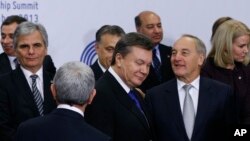MOSCOW —
Pressured by street demonstrations at home, Ukraine’s president reluctantly traveled to a European Union summit in Lithuania. But he frustrated five years of negotiations by failing to sign on Friday a long-awaited free trade pact and political association treaty with the EU.
German Chancellor Angela Merkel summed up European frustration when she was caught on camera bluntly lecturing President Viktor Yanukovych: “We expected more.”
In the video, Yanukovych responds to the German leader: “The economic situation in Ukraine is very hard. And we have big difficulties with Moscow.”
Moscow exerted heavy economic pressure on two other former Soviet republics, Moldova and Georgia. But they both initialed similar pacts with the EU on Friday. To shore up Moldova’s resolve, the EU offered the impoverished country’s 3.5 million citizens visa-free travel entry within the 28-nation bloc.
Moscow pressure
Poland’s President Bronislaw Komorowski told a Polish daily Gazeta Wyborcza that Russian President Vladimir Putin deployed against Ukraine "a policy of hard pressure, using money, economics, and politics. And maybe something else instead.”
European Union Council President Herman van Rompuy told reporters, “We have to overcome pressure from abroad. This is a time of courage. This is a time for decisions.”
The European Union has 500 million consumers and an economy six times the size of the rival bloc that Russian President Vladimir Putin wants Ukraine to join.
In Moscow, Viktor Mironenko, Europe analyst at Russia’s Academy of Sciences, says the main focus of Ukraine’s leader is to win re-election in presidential elections in March 2015.
“The President of Ukraine thinks above all about elections of 2015, and to leave his hands free,” he said of Yanukovych’s strategy.
In a GfK Ukraine public opinion survey conducted last month, 45 percent of Ukrainian respondents said they favored joining the European Union - more than three times the 14 percent that wanted to join Putin’s rival Eurasian Union.
Huge protests
Mironenko said massive street protests across Ukraine this past week surprised Yanukovych and forced him to fly Thursday to Lithuania for the European Union summit
Yulia Vymyatnina, economics professor European University at St. Petersburg, says that Russia’s leaders do not trust the Ukrainian leader.
“They feel pretty sure that they can secure Yanukovych’s loyalty,” she said. “But, personally, I think that if there really a good offer coming from Europe, Yanukovych actually could sign an agreement.”
And that change of heart could come one year from now, in final weeks before Ukraine’s presidential election.
Keeping Ukraine’s political calendar in mind, EU leaders left Lithuania on Friday stressing that they are leaving the door open to Ukraine, the largest former republic of the Soviet Union, after Russia.
German Chancellor Angela Merkel summed up European frustration when she was caught on camera bluntly lecturing President Viktor Yanukovych: “We expected more.”
In the video, Yanukovych responds to the German leader: “The economic situation in Ukraine is very hard. And we have big difficulties with Moscow.”
Moscow exerted heavy economic pressure on two other former Soviet republics, Moldova and Georgia. But they both initialed similar pacts with the EU on Friday. To shore up Moldova’s resolve, the EU offered the impoverished country’s 3.5 million citizens visa-free travel entry within the 28-nation bloc.
Moscow pressure
Poland’s President Bronislaw Komorowski told a Polish daily Gazeta Wyborcza that Russian President Vladimir Putin deployed against Ukraine "a policy of hard pressure, using money, economics, and politics. And maybe something else instead.”
European Union Council President Herman van Rompuy told reporters, “We have to overcome pressure from abroad. This is a time of courage. This is a time for decisions.”
The European Union has 500 million consumers and an economy six times the size of the rival bloc that Russian President Vladimir Putin wants Ukraine to join.
In Moscow, Viktor Mironenko, Europe analyst at Russia’s Academy of Sciences, says the main focus of Ukraine’s leader is to win re-election in presidential elections in March 2015.
“The President of Ukraine thinks above all about elections of 2015, and to leave his hands free,” he said of Yanukovych’s strategy.
In a GfK Ukraine public opinion survey conducted last month, 45 percent of Ukrainian respondents said they favored joining the European Union - more than three times the 14 percent that wanted to join Putin’s rival Eurasian Union.
Huge protests
Mironenko said massive street protests across Ukraine this past week surprised Yanukovych and forced him to fly Thursday to Lithuania for the European Union summit
Yulia Vymyatnina, economics professor European University at St. Petersburg, says that Russia’s leaders do not trust the Ukrainian leader.
“They feel pretty sure that they can secure Yanukovych’s loyalty,” she said. “But, personally, I think that if there really a good offer coming from Europe, Yanukovych actually could sign an agreement.”
And that change of heart could come one year from now, in final weeks before Ukraine’s presidential election.
Keeping Ukraine’s political calendar in mind, EU leaders left Lithuania on Friday stressing that they are leaving the door open to Ukraine, the largest former republic of the Soviet Union, after Russia.




